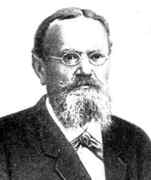Person: Schröder, Ernst

Ernst Schröder was a German mathematician who did important work is in the area of algebra, set theory and logic. His work on ordered sets and ordinal numbers is fundamental to the subject.
Mathematical Profile (Excerpt):
- Heinrich Schröder was born in Munich on 28 September 1810, studied at the University of Munich and became a professor of physics in high schools.
- He worked first at the Polytechnic School in Munich, then the Lyceum in Solothurn and, at the time Ernst was born, he was professor of physics and chemistry at the Higher Bürgerschule in Mannheim.
- After graduating from the Mannheim Lyceum, Schröder entered the University of Heidelberg.
- While Schröder was undertaking research with Hesse as his advisor, several other students, who would soon become famous, were also undertaking doctoral studies with Hesse at Heidelberg.
- For example, Adolph Mayer (doctorate in 1861) and Heinrich Weber (doctorate in 1863) were students of Hesse at the same time as Schröder, while Olaus Henrici arrived in Heidelberg to begin his studies in 1862.
- The Ruprecht-Karls-Universität Heidelberg awarded Schröder a doctorate in 1862 for his thesis Über die Vielecke von gebrochener Seitenzahl oder die Bedeutung der Stern-Polygone in der Geometrie.
- Hesse had taught Carl Neumann, Franz Neumann's son, so with these strong links between Franz Neumann and the staff at Heidelberg, it is little surprise that after the award of his doctorate Schröder went to Königsberg to spend two years studying mathematical physics with Franz Neumann and mathematical analysis with F J Richelot.
- In 1864, after his two years in Königsberg, Schröder took the examinations to qualify him to teach mathematics and natural sciences in gymnasiums.
- Schröder volunteered for the army and, despite his poor eyesight, he was accepted.
- The Black Forest was rather different from the Swiss Alps, but Schröder took full advantage of the area making many long hikes during his years in Baden-Baden.
- Like Schröder, Lüroth grew up in Mannheim and the two became friends while at school there.
- Lüroth had been appointed professor of mathematics at the Technische Hochschule in Karlsruhe in 1869 and his signature is on Schröder's letter of appointment.
- Schröder remained at Karlsruhe for the rest of his career, being made Director of the Technische Hochschule for the year 1890-91.
- Ernst Schröder's important work is in the area of algebra, set theory and logic.
- What was the connection between logic and algebra in Schröder's research?
- Schröder started out being interested in mathematical physics, and his move towards logic was simply an attempt to deepen its foundations.
- Now one sees Schröder moving towards logic with Lehrbuch der Arithmetik und Algebra für Lehrer und Studierende Ⓣ(A textbook of arithmetic and algebra for teachers and students) published by Teubner in 1873.
- In Vorlesungen über die Algebra der Logik Ⓣ(Lectures on the algebra of logic), a large work published between 1890 and 1905 (it was edited and completed by Eugen Müller after his death), Schröder gave a detailed account of algebraic logic, provided a source for Alfred Tarski to develop the modern algebraic theory and gave an extensive bibliography of the history of logic.
- Schröder's concept of solving a relational equation was a precursor of Skolem functions, and he inspired Löwenheim's formulation and proof of the famous theorem that every sentence with an infinite model has a countable model, the first real theorem of modern logic.
- Schröder had a very high opinion of Charles Sanders Peirce.
- The two corresponded but Peirce showed a more mixed attitude towards Schröder, sometimes praising him while on other occasions he was highly critical.
- Schröder considered quantifiers (or, at least, sums and products equivalent to quantifiers for a fixed domain) in first- and higher-order logic.
- While Peirce overall praised Schröder, he nevertheless sometimes ferociously attacked him, in print and in private correspondence.
- Schröder venerated Peirce, however, and had in abundance what Peirce acknowledged he lacked: self-control.
- Schröder had many sporting hobbies: cycling, hiking, swimming, ice-skating, horseback riding, and gardening.
- Given what a fit man Ernst Schröder was, it is surprising that he died at the age of 60.
- The thesis was devoted to a comparison of the logical systems of Ernst Schröder and Bertrand Russell, with special attention to their different treatments of relations.
Born 25 November 1841, Mannheim, Germany. Died 16 June 1902, Karlsruhe, Germany.
View full biography at MacTutor
Tags relevant for this person:
Origin Germany, Set Theory
Mentioned in:
Parts: 1
Thank you to the contributors under CC BY-SA 4.0! 

- Github:
-

- non-Github:
- @J-J-O'Connor
- @E-F-Robertson
References
Adapted from other CC BY-SA 4.0 Sources:
- O’Connor, John J; Robertson, Edmund F: MacTutor History of Mathematics Archive
